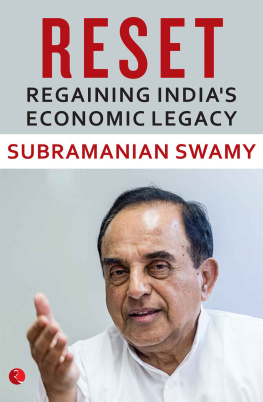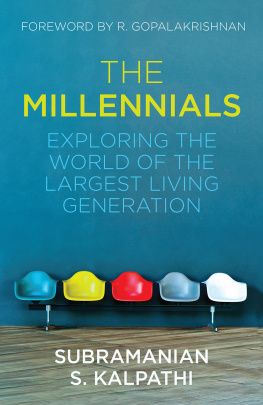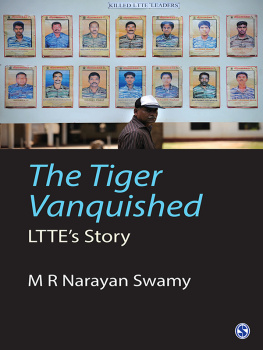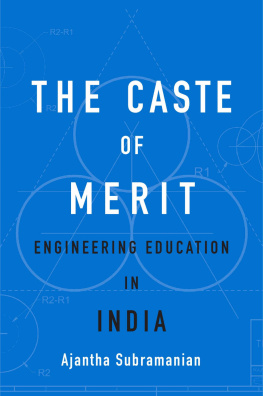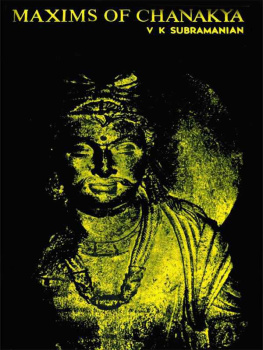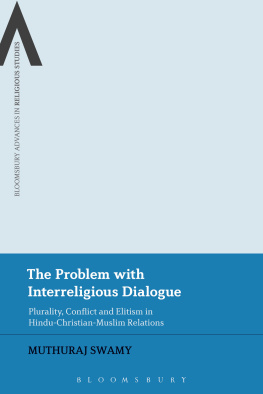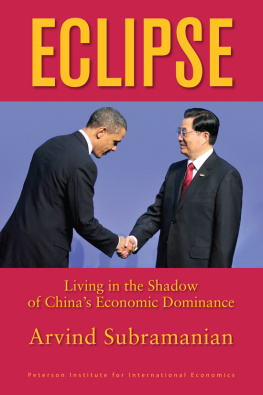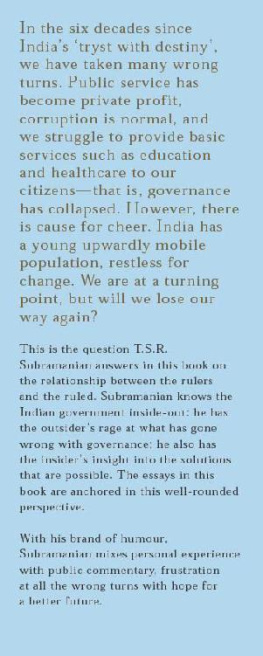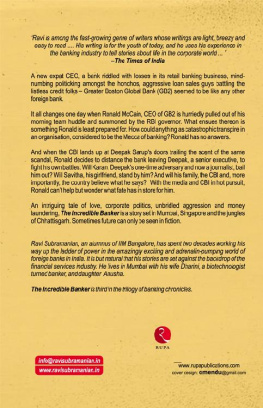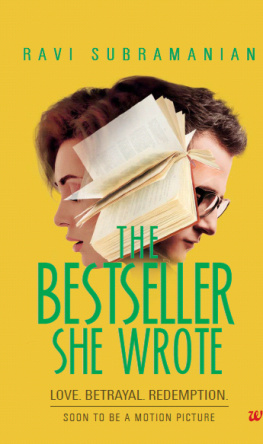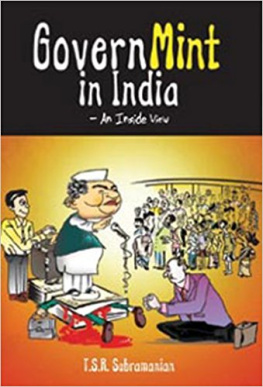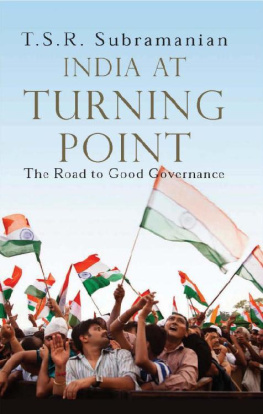Subramanian Swamy - RESET: Regaining India’s Economic Legacy
Here you can read online Subramanian Swamy - RESET: Regaining India’s Economic Legacy full text of the book (entire story) in english for free. Download pdf and epub, get meaning, cover and reviews about this ebook. year: 2019, publisher: Rupa Publications India, genre: Politics. Description of the work, (preface) as well as reviews are available. Best literature library LitArk.com created for fans of good reading and offers a wide selection of genres:
Romance novel
Science fiction
Adventure
Detective
Science
History
Home and family
Prose
Art
Politics
Computer
Non-fiction
Religion
Business
Children
Humor
Choose a favorite category and find really read worthwhile books. Enjoy immersion in the world of imagination, feel the emotions of the characters or learn something new for yourself, make an fascinating discovery.
- Book:RESET: Regaining India’s Economic Legacy
- Author:
- Publisher:Rupa Publications India
- Genre:
- Year:2019
- Rating:5 / 5
- Favourites:Add to favourites
- Your mark:
- 100
- 1
- 2
- 3
- 4
- 5
RESET: Regaining India’s Economic Legacy: summary, description and annotation
We offer to read an annotation, description, summary or preface (depends on what the author of the book "RESET: Regaining India’s Economic Legacy" wrote himself). If you haven't found the necessary information about the book — write in the comments, we will try to find it.
RESET: Regaining India’s Economic Legacy — read online for free the complete book (whole text) full work
Below is the text of the book, divided by pages. System saving the place of the last page read, allows you to conveniently read the book "RESET: Regaining India’s Economic Legacy" online for free, without having to search again every time where you left off. Put a bookmark, and you can go to the page where you finished reading at any time.
Font size:
Interval:
Bookmark:
RESET

Published by
Rupa Publications India Pvt. Ltd 2019
7/16, Ansari Road, Daryaganj
New Delhi 110002
Copyright Subramanian Swamy 2019
The views and opinions expressed in this book are the authors own and the facts are as reported by him which have been verified to the extent possible, and the publishers are not in any way liable for the same.
All rights reserved.
No part of this publication may be reproduced, transmitted, or stored in a retrieval system, in any form or by any means, electronic, mechanical, photocopying, recording or otherwise, without the prior permission of the publisher.
ISBN: 978-93-5333-651-6
First impression 2019
10 9 8 7 6 5 4 3 2 1
The moral right of the author has been asserted.
This book is sold subject to the condition that it shall not, by way of trade or otherwise, be lent, resold, hired out, or otherwise circulated, without the publishers prior consent, in any form of binding or cover other than that in which it is published.
CONTENTS
PREFACE
India: In Search of a Renaissance
In the autumn of 1969, I returned to India after a seven-year stay in the United States (US). The first two years were spent in getting a PhD from Harvard University, whereafter I joined the Harvard faculty for five years to teach Economics to graduate and undergraduate students. Upon my return to India, I joined the Indian Institute of Technology (IIT), Delhi, as a Professor of Economics. But soon after, I ran into a controversy around socialist planning, which was then the official policy. I challenged the then conventional wisdom that socialist planning was a superior route for economic progress as compared to a competitive market economy. I also questioned whether social justice was optimized through socialist redistribution of income by progressive taxation and nationalization, rather than by a rapid growth in the gross domestic product (GDP) caused by encouraging investment through incentives, and based on innovation, and through employment generation.
I also felt there was a third way of economic development which would harmonize a number of objectives, such as growth, social justice and creating room for spiritual values. Both socialism titled Swadeshi Plan in 1970, which was presented on the floor of the Lok Sabha by Atal Bihari Vajpayee, the then Parliamentary leader of the Bharatiya Jana Sangh. The monograph was an instant hit in the country, partly because during the Budget session of 1970, Mrs Indira Gandhi, as the prime minister, ridiculed the monograph on the floor of the Parliament. She said that the Plan had overambitious goals and referred to me as Santa Claus. The political influence and blackmail of the Soviet Union to obtain intellectual compliance for Soviet planning, however, was so strong that few dared then to speak up against the futility of Indians continuing with the Soviet model. However, since I did, the establishment, following Mrs Gandhis speech, as if on cue, ensured the termination of my professorship at IIT Delhi. The professorship was restored retrospectively two decades later by a Delhi court, but by then, I had become a Cabinet minister. Hence, though I resumed my professorship in March 1991, I resigned the very next day, and also recovered at an 8 per cent interest rate decades of my past unpaid basic salary and other emoluments.
After termination of the professorship in 1972, my ideas on India-specific economic development became part of my lectures around the country. But I could not find the time needed to convert the Swadeshi Plan monograph into a book. After years of becoming a Member of Parliament (MP) in 1974, and then combating the Emergency declared by Mrs Gandhi in 1975, it has become possible to devote time for it, and hence this book has now been penned.
In this book, I have, for the period of 150 years from 1870 to 2019, focused not so much on the historical narrative of Indias economic developmentor the lack of itbut on distilling out the consequences of the economic ideology adopted in three main phases. First, British imperialism (18701947), during which period, according to me, $71 trillion worth of resources was drained off to Britain. Thereafter, the Soviet command economy model took root (195090), which ended with the collapse of the Union of Soviet Socialist Republics (USSR) in 1991. Thus, liberation from state commandism came through the economic reforms (19912019) initiated by me in 199091, and during 199296 by assisting P.V. Narasimha Rao while holding a Cabinet rank in his government.
Over the past several millennia of acknowledged civilized history of the world, Indiaidentified globally as Hindustan (or just Yindu to the Chinese long before it was known as Hind to the Arabs)was, by contemporary standards, the most developed and civilized nation, until AD 1750, by which time foreign aggression had already taken its toll and emaciated India economically. India, thus, as the Global Number 1 economically declined from the end of the twelfth century to become the poorest by 1947.
From 1870 to 1947, British imperialism in India was structured by a policy of killing domestic entrepreneurship, blocking innovations and extracting resources from agriculture through land-revenue collectors called zamindars. The contrast is visible in statistical data of development between the directly British-ruled provinces of India and the indirectly administered princely states by appointed regents of British imperialists. The damage done by imperialism to Indias agricultural performance through arbitrary cruel revenue extraction and siphoning it off to Britain or for local administration contrasts sharply with the economic performance in agriculture of princely states, which had better development and growth rates of output in agriculture. The fact is that foreign-ruled governments which funnel funds out of a nation, as the British government did in India for a century (and could not do in China due to that nations indigenous governance), wreck all the inter-sectoral balances in the economy and thus destabilize and impoverish the nation.
By bleeding agriculture to the bone, exporting and draining national resources estimated at $71 trillion at current prices, and by blocking native innovation, the British rule set India two centuries back in development. India thus missed the Industrial Revolution. Indias industrial development at Independence was spotty and served British trade interests and not the setting up of industrialization in India. By 1947, India, once the worlds richest, had become the poorest, with a per capita income of just $150. But India survived, retaining the substance of its ancient culture and religionunlike nations such as Persia, Egypt, Rome and Greece, which were forced to abandon their culture and convert to the religion and culture of their invaders. India is globally the most prominent exception. It remained defiant and unconverted by foreign rule, despite two major brutal and diabolical foreign onslaughts: one of Muslims and the other of Christian subversion via imperialism, totalling an 800-year span of Indias history.
For free India, since 1947, to regain the earlier highest global position, and to recover from the past exploitation and imposed psychological damage, it was first important to reverse the regression and move people from negativity to an optimistic outlook. This required an innovational dynamic mindset of the new Indian leadership. Upon achieving freedom, this negativity began to diminish but very slowly, because after Gandhis and Patels untimely deaths, the Nehru governments decision to accept the history of India as written by paid British scholars, such as Max Mueller and his slavish Indian tutees, who had imposed into
Next pageFont size:
Interval:
Bookmark:
Similar books «RESET: Regaining India’s Economic Legacy»
Look at similar books to RESET: Regaining India’s Economic Legacy. We have selected literature similar in name and meaning in the hope of providing readers with more options to find new, interesting, not yet read works.
Discussion, reviews of the book RESET: Regaining India’s Economic Legacy and just readers' own opinions. Leave your comments, write what you think about the work, its meaning or the main characters. Specify what exactly you liked and what you didn't like, and why you think so.

